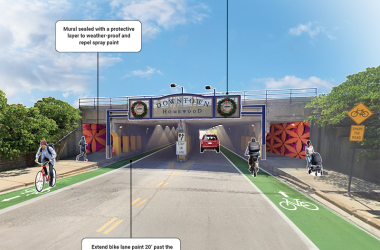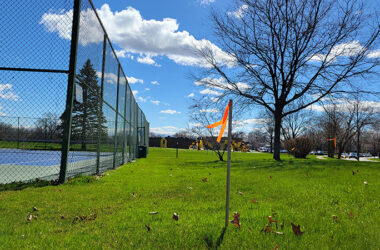The first days of each school year can be stressful for many parents of young children, but this year, a group of local parents is feeling the stress more acutely and are seeking help from school officials to address concerns about the safety of in-person learning.
The cause of their distress is a convergence of COVID-19 pandemic factors. The Illinois State Board of Education has mandated a return to in-person learning, and a new virus strain, the Delta variant, is fueling a surge in cases nationwide and locally.
In a news conference on Aug. 4 announcing a statewide mask mandate for schools, Illinois Department of Public Health Director Ngozi Ezike said COVID-19 has shifted to become the “pandemic of the unvaccinated,” a phrase that has become common among health officials across the country as the Delta variant surges while vaccines are proving to be effective protection against it.
Among the unvaccinated are almost all elementary school students. None of the currently available vaccines have been approved for anyone under age 12.
Superintendents of the three districts serving Homewood and Flossmoor all confirmed that they are required to comply with the latest guidance from ISBE, which has mandated a return to in-person learning with limited exceptions available for remote learning.
The ISBE exception allows remote learning “for students who have not received a COVID-19 vaccine or who are not eligible for a COVID-19 vaccine, only while they are under quarantine consistent with guidance or requirements from a local public health department or the Illinois Department of Public Health.”
A group of parents came together on a local social media page when Neesha Raymond posted a question: “Is anyone reluctant to send their student back to school in person??? I’m really nervous.”
Her question attracted more than 80 responses from other parents, most of whom shared her concerns, she said.
Raymond, who has a child in Homewood-Flossmoor High School, said she became concerned when she could not find a detailed back-to-school safety plan on the District 233 website.
“They have nothing in detail that states what measures the school will take to ensure my child will be safe while walking the halls, changing classes, eating lunch, riding the bus or walking the path,” she said in an email to the Chronicle. ” I think the lack of plan, combined with no covid testing or contact tracing will be a perfect storm for the enhanced spread of the coronavirus.”
Erika Schafer of Flossmoor said the current ISBE guidelines were created earlier this summer, prior to the emergence of the Delta variant surge, and could be outdated. She worries that state officials have not adequately accounted for the fact that the new strain is much more contagious than the original virus.
A recent report from the Centers for Disease Control and Prevention said the Delta variant compared with chicken pox, which is among the most contagious viruses. A recent NPR report notes that claim could be an exaggeration, but notes that Delta is more than twice as contagious as the original virus.
“I would like to see ISBE revise their rule so at the very least elementary students have a remote option, or schools could allow for an a.m./p.m. schedule,” Schafer said. She noted that school mitigation plans last year included remote options and hybrid models to reduce the population density of schools, aiding in physical distancing, so the mechanism already exists.
Another District 161 parent, who asked to be identified only by her first name, echoed Schafer’s concern that the Delta variant was not accounted for in the current state plan.
“The Delta variant cannot be contained in a school full of unvaccinated children, at full capacity, with teachers who will likely be focused on teaching and unable to monitor every sneeze, cough and properly washed hand,” Nikki said.
Her alarm is fueled by the fact that, in spite of taking precautions such as mask wearing and gathering only outoors, her family, including vaccinated adults, contracted COVID-19.
Ro’Shunda Russell, also a District 161 parent, said she objects to the choice she is being forced to make, between expensive private education options and sending her child to a school situation she feels will not be safe.
“We would like to have remote learning to ensure our kids will still get the education our kids need from our district,” she said, noting that she moved to the community specifically for the quality education it provides. “It’s very disheartening. My son needs the education. He hasn’t experienced school really. I’m just trying to give him the best education I can.”
The parents have created a new group on Facebook, Safe Return HF, to share information and concerns.
District 161 Superintendent Dana Smith said the district is taking pandemic safety very seriously.
“Our COVID prevention protocols are as important now as they were when this started,” he said. “Our parents and community depend on us doing everything that we can to keep our children safe and that is our plan.”
As of Tuesday, he had received about five email messages from parents asking for a remote learning option.
District 153 Superintendent Scott McAlister said he has heard from parents on both sides of the issue.
“All of us have safety as our primary concern. I am confident that with our mitigations in place, and with a consistent eye on local positivity and vaccination rates, we can provide a safe place for our students and adults this fall.”
Community vaccination and transmission rates are considered a factor in school safety. Homewood and Flossmoor each have good vaccination rates compared to surrounding communities. About 59% of Flossmoor residents are fully vaccinated, and almost 55% of Homewood residents are. Both are still short of the 70% to 80% scientists believe will provide herd immunity against the virus.
Both communities are seeing an increase in cases, however. In the three months from May through July, Flossmoor had 37 new cases. In July, the village had 54 new cases.
Homewood’s rate has been steadier, with 88 new cases in May through July, and about 25 in July. In the first 11 days of August, both villages have seen more than 30 new cases.
District 233 Superintendent Von Mansfield said he was aware of parents’ concerns but had not received an unusual number of comments.
“I know parents have had discussions online and through social media outlets, however, we are complying with and following state guidelines at this juncture. Our options are extremely limited,” he said. “Do note all this is subject to change if the governor or the Illinois State Board of Education decides to change any mandates or guidelines in relation to Covid-19 or the Covid-19 Delta variant if they become more prevalent.”
Although parents have expressed frustration with the situation, several acknowledge the limits placed on local administrators.
“They’re just doing their job,” Russell said. “We as parents have to do our job to keep our kids safe.”
Several parents said they were reaching out to ISBE officials to press their case for remote learning and other options.
So far, though, ISBE is sticking with the current guidelines. Jackie Matthews, ISBE executive director of communications, said the mask requirement is considered the most effective way to keep students safe.
“Masks work best when everyone wears one. Research conducted by the CDC found that schools are safe when they have prevention strategies in place, as documented in the updated guidance from ISBE and IDPH. The requirement remains that all schools will provide full in-person instruction this fall with limited exceptions,” she said.
Related stories:
- Safety measures take center stage in District 161’s fall reopening discussions (July 23, 2021)
- District 153 board approves return-to-school plan (Aug. 11, 2021)
More information:
- District 161 COVID-19 dashboard
- District 233 COVID-19 dashboard
- Illinois school outbreak statistics
- ISBE Revised Public Health Guidance for Schools
Correction: Erika Schafer’s last name was misspelled in the original version of this story. The Chronicle apologies for the error.



